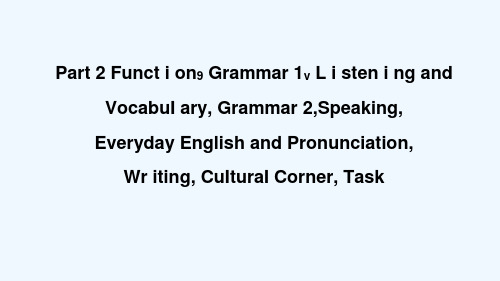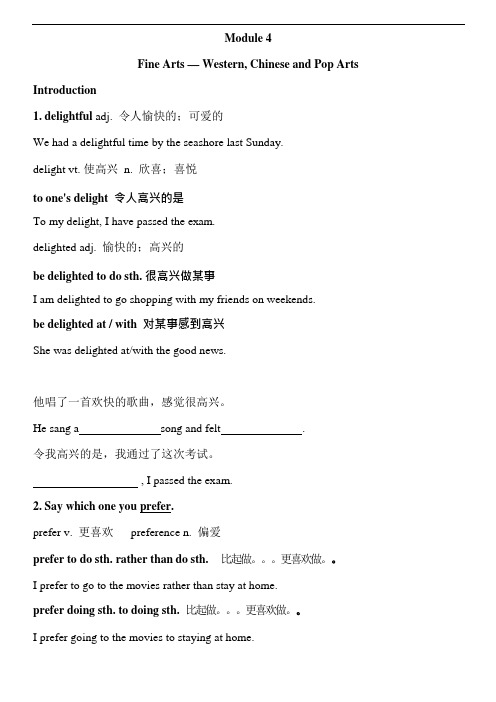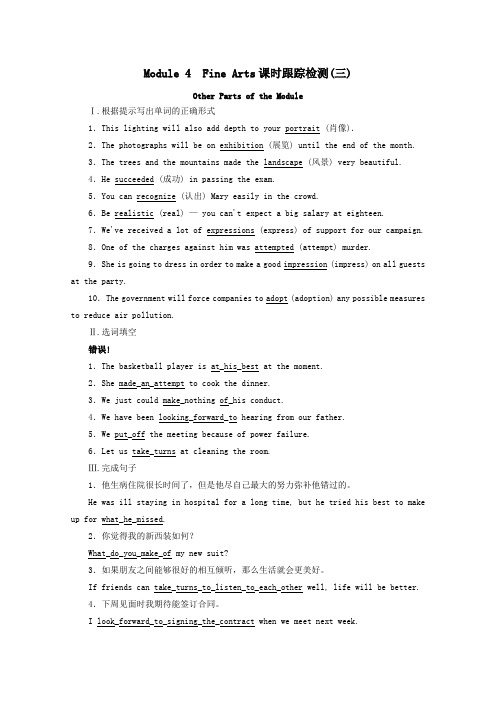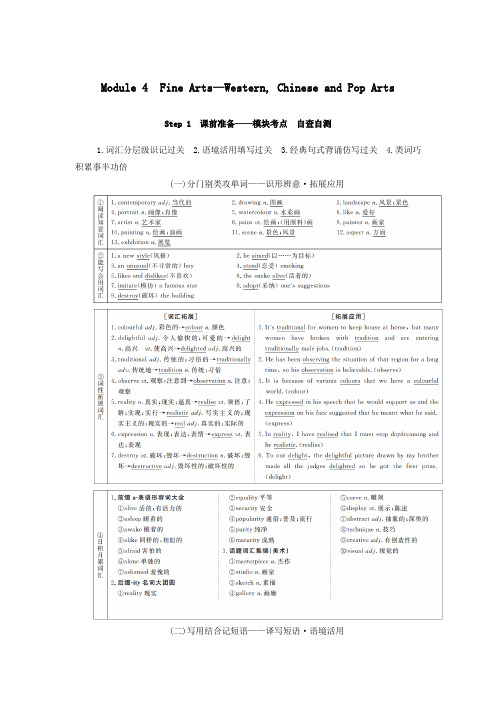2019-2020学年外研版高中英语必修2_Module 4 Fine Arts—We4.2
高中英语外研必修2课件:Module4FineArtsPart2

Part 2 Funct i on9 Grammar 1v L i sten i ng and VocabuI ary, Grammar 2,Speaking,Everyday English and Pronunciation,Wr iting, CuIturaI Corner, Task语言知识预习核心知识探究备用讲义语言知识•预习I •核心单词1. exhibition n.展览2. expression n.表现;表达3. landscape.n・风景;景色;风景画;山水画4. realise_ vt・领悟;了解;实现;实行5. realistic adj.现实主义的;写实主义的6. watercolour n.水彩画7. destroy vt・破坏:毁坏n•破坏destructionII・重点短语Lput off推迟;延期2.take turns 轮流3・ a series of —系列的巧记单词合成词watered our fwat er+colourexpression f express (v・表达)+~ion 派生词exhibition f exhibit (v.展览)+-ionIll •课文预习Read the passage on P39 and tel I if the fol lowing statements are true (T) or false (F)・1・Pablo Picasso is the nineteenth-century, s greatest western artist.2.From 1902 to 1904 Picasso painted a series of pictures where the maincolour was blue・3.The period from 1904 to 1906 was known as Picasso' s "pink period"・答案:1・F 2.T 3.T核心知识•探究1. She put off comp I et i ng the picture, because she didn' t I ike it•她把完成这幅画的时间推迟了,因为她不喜欢这幅画。
外研版高中英语必修2Module 4 Fine Arts – Western Chinese and Pop Arts课件

Tห้องสมุดไป่ตู้aching aims
1. To get Ss to learn some words to describe arts; 2. To get Ss to learn about some world-class artists & their styles; 3. To arouse Ss’ interest in arts.
阅读技巧点拨:先读题,注意关键词---人名
Careful -reading
PassageA 1.Picasso is considered to be the greatest •1.What is Picasso considered to be? western artist of the 20th century. 2.He started Cubism. •2.Which art movement did Picasso start? 3.He painted objects and people with aspects ofpaint the object or and person •different 3.How did Picasso objects showing at the same time. people?
PassageB
Pop art was an important modern
4. movement What does Pop artto mean? that aimed show art ____________________ ordinary 20th-century city life _________________________________.
外研社高中英语必修2module4(可编辑修改word版)

Module 4Fine Arts — Western, Chinese and Pop Arts Introduction1.delightful adj. 令人愉快的;可爱的We had a delightful time by the seashore last Sunday.delight vt. 使高兴n. 欣喜;喜悦to one's delight 令人高兴的是To my delight, I have passed the exam.delighted adj. 愉快的;高兴的be delighted to do sth. 很高兴做某事I am delighted to go shopping with my friends on weekends.be delighted at / with 对某事感到高兴She was delighted at/with the good news.他唱了一首欢快的歌曲,感觉很高兴。
He sang a song and felt .令我高兴的是,我通过了这次考试。
, I passed the exam.2.Say which one you prefer.prefer v. 更喜欢preference n. 偏爱prefer to do sth. rather than do sth. 比起做。
更喜欢做。
I prefer to go to the movies rather than stay at home.prefer doing sth. to doing sth. 比起做。
更喜欢做。
I prefer going to the movies to staying at home.prefer sth. to sth. 喜欢。
胜过。
I prefer jazz to rock music.题:The visiting professor giving lectures to students invited to meetings at times.A.preferred; to beingB. preferred to; rather thanC. preferred; than beingD. preferred to; to beingReading and vocabulary3.alive, live,lively 与living 辨析alive “活着的”,通常做后置定语;表语No man alive is greater than he.She must be still alive.live “活着的”, 通常做前置定语;“现场直播的”a live fish ; a live TV program lively“活泼的,充满生气的”Jenny is a lively girl.living “活着, 尚在人间” “生物”all living thingsmake/earn a living 谋生make/earn one’s living 谋生He works hard to make a living.题:I watched a TV program. There was a boy liking all things. He kept a fish in a small jar. He decided to free it and keep the fish in the river.--What a pity! I’ve not got a ticket for the football match.--Don’t worry. It’ll be broadcast .A.liveB. livelyC. aliveD. living状元堂内江校区4.observe vt. 观察;注意到;遵守;庆祝We observed that it had turned cloudy.We should observe traffic rules.She will observe her birthday on Sunday.observe a rule 遵守规则He always observes a rule strictly.observe sb. do sth.看见某人做了某事(全过程)observe sb. doing sth. 看见某人正在做某事(正在)I observed him enter the office.He observed a stranger hanging around the store.observer n. 观察者;遵守者;评论者observation n. 观察,注意observatory n. 天文台;气象台;观察台题:Though having lived abroad for many years, many Chinese still the traditional customs.(湖北)A.performB. possessC. observeD. support5.a style of painting adopted by a group of artistsadopt vt.采纳;采用;收养They adopted my suggestion.The adopted son adopted his advice.adoption n. 采用,采纳;过继千里之行始于足下状元之路尽在今朝I regret for not having his advice, otherwise I wouldn’t have suffered such a lot of loss in business.A. adaptedB. adoptedC. adjustedD. accessed6.This is a painting by the Spanish artist, Pablo Picasso, considered to be the greatest western artist of the twentieth century.consider v. 认为, 把。
2019_2020学年高中英语Module4FineArts课时跟踪检测(三)(含解析)外研版必修2

Module 4 Fine Arts课时跟踪检测(三)Other Parts of the ModuleⅠ.根据提示写出单词的正确形式1.This lighting will also add depth to your portrait (肖像).2.The photographs will be on exhibition (展览) until the end of the month.3.The trees and the mountains made the landscape (风景) very beautiful.4.He succeeded (成功) in passing the exam.5.You can recognize (认出) Mary easily in the crowd.6.Be realistic (real) — you can't expect a big salary at eighteen.7.We've received a lot of expressions (express) of support for our campaign.8.One of the charges against him was attempted (attempt) murder.9.She is going to dress in order to make a good impression (impress) on all guests at the party.10.The government will force companies to adopt (adoption) any possible measures to reduce air pollution.Ⅱ.选词填空错误!1.The basketball player is at_his_best at the moment.2.She made_an_attempt to cook the dinner.3.We just could make_nothing of_his conduct.4.We have been looking_forward_to hearing from our father.5.We put_off the meeting because of power failure.6.Let us take_turns at cleaning the room.Ⅲ.完成句子1.他生病住院很长时间了,但是他尽自己最大的努力弥补他错过的。
(完整版)外研社高中英语必修2module4

Module 4Fine Arts — Western, Chinese and Pop Arts Introduction1. delightful adj. 令人愉快的;可爱的We had a delightful time by the seashore last Sunday.delight vt. 使高兴n. 欣喜;喜悦to one's delight 令人高兴的是To my delight, I have passed the exam.delighted adj. 愉快的;高兴的be delighted to do sth. 很高兴做某事I am delighted to go shopping with my friends on weekends.be delighted at / with 对某事感到高兴She was delighted at/with the good news.他唱了一首欢快的歌曲,感觉很高兴。
He sang a _____________ song and felt _____________ .令我高兴的是,我通过了这次考试。
__________________ , I passed the exam.2. Say which one you prefer.prefer v. 更喜欢preference n. 偏爱prefer to do sth. rather than do sth.比起做。
更喜欢做。
I prefer to go to the movies rather than stay at home.prefer doing sth. to doing sth. 比起做。
更喜欢做。
I prefer going to the movies to staying at home.I prefer jazz to rock music.题:The visiting professor____ giving lectures to students _____ invited to meetings at times.A. preferred; to beingB. preferred to; rather thanC. preferred; than beingD. preferred to; to beingReading and vocabulary3. alive, live,lively与living辨析alive“活着的”,通常做后置定语;表语No man alive is greater than he.She must be still alive.live“活着的”, 通常做前置定语;“现场直播的”a live fish ; a live TV programlively“活泼的,充满生气的”Jenny is a lively girl.living“活着, 尚在人间”“生物”all living thingsmake/earn a living谋生make/earn one’s living谋生He works hard to make a living.题:I watched a _______TV program. There was a boy liking all_____ things. He kept a _____ fish in a small jar. He decided to free it and keep the fish ____ in the river.--What a pity! I’ve not got a ticket for the football match.--Don’t worry. It’ll be broadcast____.A. liveB. livelyC. aliveD. living4. observe vt. 观察;注意到;遵守;庆祝状元堂内江校区千里之行 始于足下 状元之路 尽在3 We observed that it had turned cloudy.We should observe traffic rules.She will observe her birthday on Sunday.observe a rule 遵守规则He always observes a rule strictly.observe sb. do sth.看见某人做了某事(全过程)observe sb. doing sth. 看见某人正在做某事(正在)I observed him enter the office.He observed a stranger hanging around the store.observer n. 观察者;遵守者;评论者observation n. 观察,注意observatory n. 天文台;气象台;观察台题:Though having lived abroad for many years, many Chinese still____ the traditionalcustoms.(湖北)A. performB. possessC. observeD. support 5. a style of painting adopted by a group of artistsadopt vt.采纳;采用;收养They adopted my suggestion.The adopted son adopted his advice.adoption n. 采用,采纳;过继I regret for not having ______ his advice, otherwise I wouldn ’t have suffered such a lot ofloss in business.A. adaptedB. adoptedC. adjustedD. accessed6. This is a painting by the Spanish artist, Pablo Picasso, considered to be the greatest western artist of the twentieth century.consider v. 认为, 把。
2020版高考英语总复习Module4FineArtsWesternChineseandPopArts教学案外研版必修2

Module 4 Fine Arts—Western, Chinese and Pop ArtsStep 1 课前准备——模块考点自查自测1.词汇分层级识记过关2.语境活用填写过关3.经典句式背诵仿写过关4.类词巧积累事半功倍(一)分门别类攻单词——识形辨意·拓展应用(二)写用结合记短语——译写短语·语境活用(三)仿写活用练句式——经典句型·仿写背诵Step 2 课堂探究——核心考点点点突破1.重点难点考点学通练透2.归纳总结拓展开阔视野3.方法规律技巧权威点拨4.面面俱到打创高效课堂第一时段Introduction, Reading And Vocabulary1.alive adj.有活力的;有生气的;活着的;仍然存在的[教材原句] It was a bad accident—they're lucky to be alive.这是一起严重事故——他们能活着实属幸运。
come alive 变得活跃起来bring... alive 使……变得活跃keep... alive 使……有活力/仍然存在选择以上短语填空①He's being ____________ on a life-support machine.②His humourous story ________ the atmosphere of the meeting really ________.③It was as if she ____________ wh en she sat down at the piano.[词义辨析]alive 作表语、补语或后置定语。
除了表示“活着的”外,还表示“有活力的;有生气的”live 表示“活的”,通常作前置定语修饰动物。
除了表示“活的”外,还表示“现场直播的”living 作表语或定语。
指“所有的生物”要用“all living things”;表示“活着的人”,要用“the living”④I watched a ________ TV program. There was a boy liking all ________ things. He kept a ________ fish in a small jar. Later on he decided to free it and kept the fish ________ in the river.[答案] ①kept alive②brought; alive③came alive④live; living; live; alive2.adopt vt.采纳;采用;收养[教材原句] Art movement means a style of painting adopted by a group of artists.艺术运动指的是一些美术家共同采纳的一种绘画风格。
2019-2020学年高中英语 Module 4 Fine Arts Western Chine
Section ⅣWriting —如何写邀请信[写作任务]假定你是李华,想邀请外教Henry一起参观中国剪纸(papercutting)艺术展。
请给他写封邮件,内容包括:1.展览时间、地点;2.展览内容。
注意:1.词数100左右;2.可以适当增加细节,以使行文连贯。
______________________________________________________________________________________________________________________________________________________________________________________________________________________________________________________________________________常用表达1.I am writing to invite you to...我写信为了邀请您……2.I wonder if you can come...我想知道您是否能来……3.We would be very glad to invite you as an..很高兴邀请您作为……4.I am sure that you will have a great time here.我保证你会度过一段快乐的时光。
5.We look forward to seeing you.盼望你的到来。
6.I hope that you won't decline my invitation.我希望你不会拒绝我的邀请。
7.I would feel honored if you could come.如果你能来,我感到很荣幸。
8.I would like to meet you here and please let me know your decision.我想要在这儿见到你,请让我知道你的决定。
2019-2020年高中英语 Module 4 Fine Arts Western Chinese
2019-2020年高中英语 Module 4 Fine Arts Western Chinese and Pop词汇练习外研版必修2VocabularyI. 根据中文意思及词性提示写出正确的形式。
1. 饮食;日常食物n.________2. 脂肪,肥肉n. ________ 脂肪的,含脂肪的adj.________3. 健康的;强健的adj._______4. 流行性感冒n. _________5. 包含; 容纳; 装有v. ________ 容器n. ________6. 毒品;药品n. ________7. 癌症n. _______8. 香烟n. ________9. 烟草;烟丝n. ________10. (药物等)上瘾的adj.________ 瘾君子n. ________11. 作曲;创作v. __________ 作文;音乐作品n. __________12. 巡回演出v. ________ 游客n. __________13. 专辑;相册n. _________14. 乐队n. ________15. 听众n. ________II. 根据语境及首字母或中文提示写出所缺单词的正确形式。
1. We were all a_______ about his safety when we found that he didn’t e back with the team.2. His children ________(很少), if ever, see him in his office.3. His c_________ with that magazine dates from 1971.4. There is a ________(禁令) on parking in this busy street.5. I hope this unexpected incident will not ________(影响) the relationship between us.6. I don’t have the t_______ for studying a foreign language.7. His behaviour has a great i_________ on those around him.8. The authors ________(巡回)the country to sell their books.9. The ___________(指挥) is good at keeping the members of the orchestra together.10. He is on a diet to ________ (减少) some weight.III. 从方框中选择恰当的短语并用其恰当形式完成句子(其中有两项为多余选项)。
2019-2020学年高中英语 Module 4 Fine Arts Western Chine
Section ⅡLearning about LanguageⅠ.单词拼写根据汉语或首字母提示,写出下列单词1.She observed(注意到) a man walking on the opposite side of the road. 2.The reality(现实) is that there is not enough money to pay for this big house. 3.It was the kind of morning when you wake up and feel really alive(有活力的). 4.In what aspect(方面) of your job have you seen the greatest changes? 5.Although it was written hundreds of years ago, it still has a(n)contemporary(当代的) feel to it.6.It is said that this new kind of products has adopted nanotechnology(纳米技术).7.The factory must aim at developing new models of machines.8.The beautiful scene of children playing in the garden made me think of my childhood.9.She's a very popular writer but I just don't like her style .10.There is so much noise outside the classroom that I could hardly stand it. Ⅱ.拓展词汇根据词性和汉语提示,写出下列单词 1.art n .艺术→artist n .艺术家 2.colour n .颜色→colourful adj.彩色的3.delight n .高兴;愉快vt .使高兴;使愉快→delighted adj.高兴的→delightful adj.令人愉快的;可爱的4.tradition n .传统→traditional adj.传统的;习俗的 5.usual adj.通常的;平常的→unusual adj.不寻常的;非凡的 [寻规律、巧记忆]根据提示补全下列短语1.be/get tired of 对……厌烦2.be fond of 喜欢;喜爱3.tell by 从……可以看出4.all the time 一直;总是5.develop an interest in 对……产生兴趣Ⅳ.选词填空选用上述短语的适当形式填空1.My father often takes me to galleries to help me develop an interest in art.2. I am getting tired of having noodles for breakfast every morning.3.I got the two of them mixed up all the time,for they're so similar.4.I can tell by his accent that he is a foreigner.5.I like listening to classical music while my sister is fond of pop music. [寻规律、巧记忆]delightful adj.令人愉快的;可爱的(2019·全国卷Ⅱ阅读理解A)I once wrote a paper on the influence of fairy tales on Roald Dahl's writing and it gave me a newappreciation for his strange and delightful words.我曾经就童话对Roald Dahl 的作品的影响写过一篇论文,这使我对他的奇特而令人愉快的文字有了新的理解。
2019-2020学年高中英语 Module 4 Fine Arts Western Chine
Module 4 Fine Arts Western Chinese and Pop Arts【导读】《战争与和平》是俄罗斯作家列夫·托尔斯泰历时13年之久完成的一部伟大作品。
它以战争为中心,以库拉金、包尔康斯基、劳斯托夫、别竺豪夫四家贵族的生活为线索,展示了19世纪最初15年的俄国历史,描绘了各个阶级的生活,是一部再现当时社会风貌的恢宏史诗。
War and Peace (Excerpt)“WELL, PRINCE, Genoa and Lucca are now no more than private estates of the Bonaparte family. No, I warn you,that if you do not tell me we are at war, if you again allow yourself to palliate all the infamies and atrocities of this Antichrist (upon my word, I believe he is), I don't know you in future, you are no longer my friend, no longer my faithful slave, as you say. There, how do you do, how do you do? I see I'm scaring you, sit down and talk to me.”These words were uttered in July 1805 by Anna Pavlovna Scherer, a distinguished lady of the court, and confidential maidofhonour to the Empress Marya Fyodorovna. It was her greeting to Prince Vassily, a man high in rank and office, who was the first to arrive at her soiree·. Anna Pavlovna had been coughi ng for the last few days; she had an attack of la grippe,as she said—grippe was then a new word only used by a few people. In the notes she had sent round in the morning by a footman in red livery, she had written to all indiscriminately:“If you have nothi ng better to do, count (or prince), and if the prospect of spending an evening with a poor invalid is not too alarming to you, I shall be charmed to see you at my house between 7 and 10. Annette Scherer.”“Heavens, what a violent outburst!”the prince respo nded,not in the least disconcerted at such a reception. He was wearing an embroidered(绣花的)court uniform, stockings and slippers, and had stars on his breast, and a bright smile on his flat face.He spoke in that elaborately choice French, in which our forefathers not only spoke but thought, and with those slow,patronising(傲慢的)intonations peculiar to a man of importance who has grown old in court society.战争与和平(节选)“啊,公爵,热那亚和卢加现在是波拿巴家族的领地,不过,我得事先对您说,如果您不对我说我们这里处于战争状态,如果您还敢袒护这个基督的敌人(我确实相信,他是一个基督的敌人)的种种卑劣行径和他一手造成的灾祸,那么我就不再管您。
- 1、下载文档前请自行甄别文档内容的完整性,平台不提供额外的编辑、内容补充、找答案等附加服务。
- 2、"仅部分预览"的文档,不可在线预览部分如存在完整性等问题,可反馈申请退款(可完整预览的文档不适用该条件!)。
- 3、如文档侵犯您的权益,请联系客服反馈,我们会尽快为您处理(人工客服工作时间:9:00-18:30)。
相似助记 2 省略不定式符号 to 的一些情况: ①在 had better“最好做……”,why not“为什么不做……” 后,要用省略不定式符号的动词原形。 ②在 would rather do than do, prefer to do rather than do“宁愿 做……而不愿做……”的结构中。③在 cannot but, cannot choose but, cannot help but, do nothing but“只好,不得不……”后,要用省略 不定式符号的动词原形。
He taught me how to cook.他教我如何做饭。 Have you decided where to spend your holiday?你决定去哪儿 度假了吗? (3)it 可以充当形式宾语,指代真正的宾语不定式,可以用于该 句型的动词有:consider, make, feel, find, think 等。 He feels it his duty to help others.他觉得帮助别人是他的职责。 He found it hard to learn maths well.他发现学好数学很难。
他为这次工作面试做了充分准备,因为他不能冒失去这次好机 会的风险。
(2)英语中有些动词短语也常跟动词-ing 作宾语。常见的有:be good at (擅长), be fond of (喜欢), be worth (值), devote to (致力于), feel like (想要), give up (放弃), have trouble/difficulty (in) (做某事有 困难), look forward to (期望), pay attention to (注意), put off (推迟), be/get used to (习惯于),insist on (坚持)等。
It's a waste of time sitting here without doing anything. 在这儿干坐着是浪费时间。 3.动名词的复合结构作主语,当动名词的逻辑主语是有生命 的人或物时,逻辑主语通常用形容词性物主代词或名词所有格形 式。
His returning back to work is a great help to us. 他回来工作对我们来说是一大帮助。
④在 feel, listen to, hear, let, have, make, watch, observe, notice, look at (口诀记忆的“一感,二听,三让,四看”)后的宾补成分要 省略不定式符号 to。
(2)可接动名词和不定式作宾语且意义差别不大的动词 ①hate, love, like, prefer 等动词后接不定式和动名词作宾语时, 意义虽相同,内涵却有些区别——接不定式作宾语时,多表示一次 性的、具体的动作;接动名词作宾语时,多表示习惯性的、一般性 的动作。
I like swimming, but I don't like to swim in this river. 我喜欢游泳,但是我不喜欢在这条河里游泳。 ②begin, start, continue 等少数几个动词后接动名词或不定式作 宾语时意义基本相同。但如果 begin, start 等用于进行时态,或其主 语是物而非人时,须用不定式。 Tom began to learn/learning how to use a computer.汤姆开始学 习如何使用电脑。 She was starting to do her homework.她正开始做作业。
We agreed to meet here but so far she hasn't turned up yet. 我们约好在此地见面,但是她到现在还没有露面。
They managed to finish the work on time.他们设法按时完成了 工作。
[巧学妙记] 歌诀巧记常接动词不定式作宾语的动词: 同意提出作计划,要求答应来帮忙。 准备决定遭拒绝,敢于选择有希望。 不能做到莫假装,设法做成决心强。 恳求安排又威胁,声称目标不犹豫。
—Remember to return the bat to me. —But I remember having returned it to you. —记住把球拍还给我。 —可是我记得已经还给你了。
—That would mean wasting a lot of labour. —Really? I don't mean to waste any labour. —那将意味着浪费许多劳动力。 —是吗?我没打算浪费劳动力。
(3)need, want, require 作“需要”讲,句子的主语为物,且句子 的主语和谓语动词后的非谓语动词之间是被动关系时,这些动词后 面可接动词-ing 形式的主动式,也可接不定式的被动式。
The windows need cleaning. =The windows need to be cleaned. 窗户需要擦了。
At the amusing performance, the audience couldn't help laughing.
看到这滑稽的表演,观众们不禁笑了起来。
I'm busy studying, so I can't help (to) do the housework. 我忙着学习,所以不能帮忙做家务劳动。
I'm looking forward to hearing from you.我盼望着收到你的来 信。
He has got used to living in the countryside.他已经习惯住在乡 下了。
[巧学妙记] 歌诀巧记常接动词-ing 形式作宾语的动词(短语): 建议考虑坚持练,(suggest, advise, consider, insist on, practise) 允许想象弃冒险,(permit, allow, imagine, give up, risk) 阻止抵抗否逃脱,(prevent, resist, deny, escape) 不禁介意保持完,(can't help, mind, keep, finish) 耽误推迟求原谅,(delay, put off, require, forgive, excuse) 承认错过欣喜欢。(admit, miss, appreciate, enjoy)
I'm considering going abroad for further study. 我在考虑出国深造。
We should avoid making the same mistake. 我们应该避免犯同样的错误。
He got well-prepared for the job interview, for he couldn't risk losing the good opportunity.
一、动词-ing 形式和动词不定式作宾语 1.动词-ing 形式作宾语 (1)下列动词只能用动词 -ing 形式作宾语: admit ( 承认), appreciate (欣赏), consider (考虑), mention (提及), delay (耽误), enjoy (喜欢),finish (完成), imagine (相像), miss (错过), practise (练习), resist (抵抗), risk (冒险), advise/suggest (建议), mind (介意), avoid (避免), allow (允许)
[名师点津] 动词-ing 形式和不定式都可以作主语,动词-ing 形式作主语表示一般或抽象的多次性行为,不定式作主语往往表示 具体的或一次性的动作。
Playing with fire is dangerous. 玩火危险。(泛指)
Be careful! To play with fire will be dangerous. 小心点!玩火会带来危险。(指一具体动作)
3.动词-ing 形式作宾语与动词不定式作宾语的用法区别
(1)可接动名词和不定式作宾语但意义不同的动词(短语)
①remember doing sth.
记得曾经做过某事
remember to do sth. 记住去做某事
②forget doing sth. 忘记已. 忘记去做某事
③stop doing sth. 停止正做的事
stop to do sth. 停下来做另外一件事(此处不定式作状语)
④mean doing sth. 意味着做某事
mean to do sth. 打算做某事
⑤regret doing sth. 后悔已经做过某事 regret to do sth. 遗憾去做某事 ⑥try doing sth. 试着做某事 try to do sth. 努力做某事 ⑦go on doing sth. 继续做同一件事 go on to do sth. 完成一件事,接着做另一件事 ⑧can't help doing sth. 禁不住做某事 can't help (to) do sth. 不能帮着做某事
2.用 it 作形式主语,而将动词-ing 形式的动词或动词短语放 到句末,以避免句子结构头重脚轻。常见句型有:It is+no good (no use, fun, a pleasure, a waste of time)+doing...。
It is no good eating too much sweet food. 吃太多的甜食没有好处。
(2)“疑问句+不定式”结构作宾语 “疑问词(who, which, when, where, how, what 等)+不定式”结 构在句中起名词作用,可充当主语、表语、宾语。 下 列 动 词 可 接 “ 特 殊 疑 问 词 + 不 定 式 ” 作 宾 语 : teach, remember, forget, decide, wonder,show, learn, consider, know 等。
